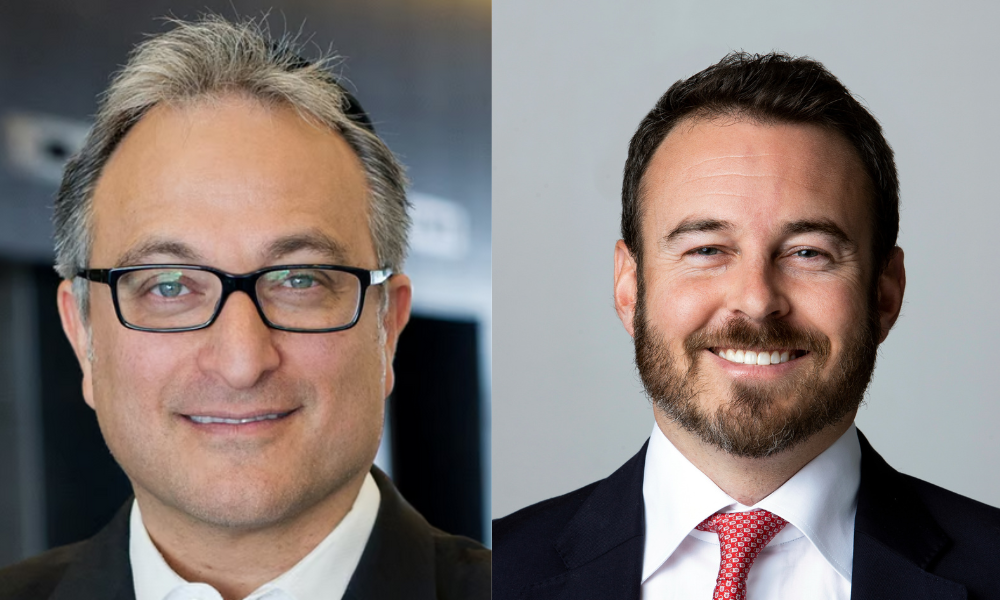From retirement savings to giving to the next generation with warm hands, two planning experts explore creative options

The First Home Savings Account has been open to Canadians for a few months, and it’s already gaining traction among young Canadians eager to jumpstart their own homeownership journey. But according to two experts, the newest registered savings plan on the block raises some other interesting planning possibilities.
“This works like an RRSP, because you’re able to claim income tax deductions on contributions you make into the account,” says Mark Halpern, CEO at WEALTHInsurance.com (pictured above, left). “It also works like a TFSA in that qualifying deposits grow tax-free and withdrawals you make from the FHSA are tax-free.”
In the months before FHSAs were introduced, Kevin Burkett, portfolio manager at Burkett Asset Management, did a podcast based on preliminary information from the federal government.
“I think now we’re seeing other interesting planning possibilities based on allowable transfers between FHSAs and other registered plans,” Burkett (above, right) says.
Starting from when they first set up their FHSA, an aspiring Canadian homeowner has 15 years to purchase a home. If they end up not using the money in their FHSA by then, they can consider a few options. One option, according to Burkett, is to transfer the balance into their RRSP.
“That creates some opportunities for folks who may not even be considering a home purchase to use the FHSA to boost the room in their RRSP, because I don't believe that transfer from your FHSA into your RRSP counts against your RRSP room,” he says. “So let’s say you’re a young 22-year-old professional trying to decide between an RRSP and a first home savings account, I think the FHSA is your best option in almost every case.”
When someone makes a withdrawal from their RRSP accounts, Burkett says, every dollar withdrawn is counted as taxable income. But with the FHSA, Canadians can avoid that penalty by instead transferring funds from their RRSP to their FHSA, which are not subject to income inclusion.
“If you transfer $40,000 to the FHSA first, you’ll then have the opportunity to draw out for that home purchase without paying any tax on the RRSP balance,” he says.
“There’s also a loan mechanism for RRSP holders to withdraw from their RRSP for a home purchase through the Home Buyers’ Plan,” Burkett says. “The First-Time Home Savings Account, in my opinion, is far superior to the Home Buyers Plan, in terms of its ability to get you a down payment on a nice home.”
While many older Canadians may make plans to leave a portion of their wealth as a legacy to help future generations, the FHSA also creates a fresh opportunity for those who want to make a generous gift to help their family today while they are alive.
“Parents or grandparents could gift $8,000 to their grandchild. If it’s in cash, there’s no taxable attribution on the gift, so it won’t come back to bite them,” he says. “If the adult child then makes an $8,000 contribution to their FHSA, they get an RRSP-type receipt, which helps them save around $4,000 in taxes. That money will now grow tax-free.”
As Halpern notes, FHSA owners can put in a maximum of $40,000 in their accounts and have the money professionally invested. That means down the line, two young Canadians who’ve been making FHSA contributions with their parents’ or grandparents’ help and also have their RRSPs and TFSAs running could potentially make a strong first step toward owning a home together by the time they get married.
“Imagine a new couple each have an FHSA and have each maxed out their contribution room, and their accounts have grown to $80,000 apiece,” he says. “Through the Home Buyers’ Plan, each spouse can take a $35,000 tax-free withdrawal from their RRSP. So they’ll potentially be able to put down a downpayment of $230,000 or more.”
While Burkett mostly works with older, wealthier clients who are ineligible to use FHSAs, he says he would readily advise young Canadians to use them.
“If I did meet a new client, a young person unsure on a home purchase, I would be recommending a First Home Savings Account regardless of intention,” he says.



